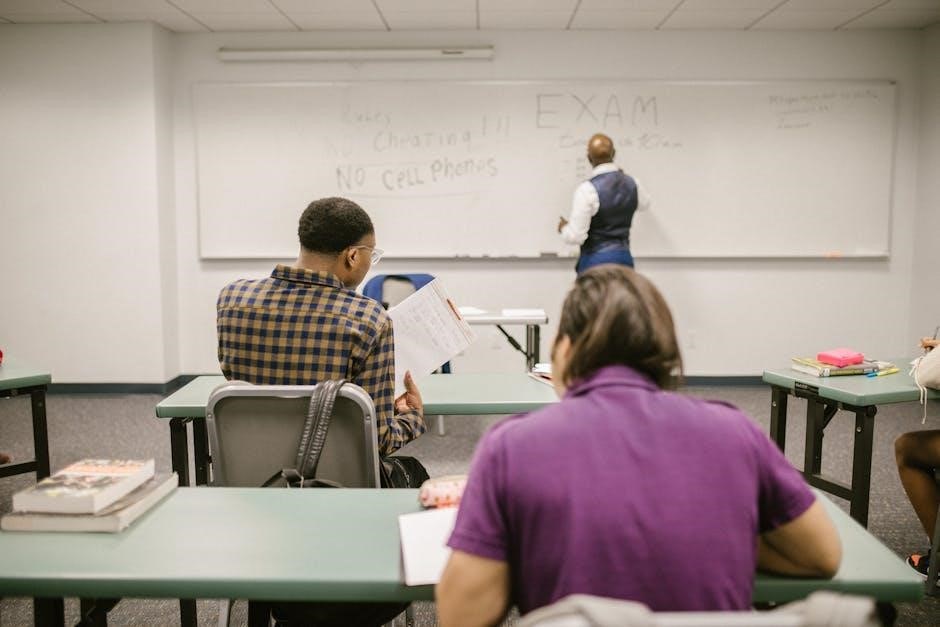The NFHS Fundamentals of Coaching Test is a benchmark for ensuring coaches meet essential standards in interscholastic sports, covering sportsmanship, legal responsibilities, and leadership principles.
Overview of the Test
The NFHS Fundamentals of Coaching Test is a comprehensive assessment designed to evaluate a coach’s understanding of essential principles in interscholastic athletics. It covers critical areas such as sportsmanship, legal responsibilities, athlete safety, and communication. The test ensures coaches are prepared to lead effectively, fostering a positive and safe environment for athletes. Intended for first-year coaches and volunteers, it serves as a foundational requirement for certification. The exam includes multiple-choice questions and practical scenarios, providing a clear benchmark for coaching competence. By mastering this test, coaches demonstrate their commitment to upholding the highest standards in their profession.
Importance of the NFHS Certification
The NFHS Certification is crucial for ensuring coaches possess the necessary knowledge and skills to lead effectively in interscholastic sports; It validates a coach’s understanding of safety protocols, legal responsibilities, and ethical practices. This certification not only enhances coaching credibility but also safeguards athletes by promoting a safe and supportive environment. Schools and athletic programs rely on NFHS-certified coaches to maintain high standards, reducing risks and fostering positive experiences for student-athletes. Achieving this certification demonstrates a coach’s commitment to professional development and their dedication to the well-being and success of their athletes.

Key Components of the NFHS Fundamentals of Coaching Test
The test covers sportsmanship, legal and ethical considerations, and coaching philosophy, ensuring coaches understand their roles in fostering a positive, safe, and ethical athletic environment for student-athletes.
Sportsmanship and Fair Play
Sportsmanship and fair play are foundational to the NFHS coaching test, emphasizing respect, integrity, and ethical behavior. Coaches must model these values to promote a positive team culture and ensure fair treatment of all athletes. The test covers strategies to handle disputes, enforce rules, and maintain a respectful environment. Understanding these principles is crucial for fostering camaraderie and teaching life lessons through sports. Coaches are expected to lead by example, creating an atmosphere where athletes can grow both on and off the field while upholding the highest standards of sportsmanship and fair play.
Legal and Ethical Considerations
Legal and ethical considerations are critical components of the NFHS test, ensuring coaches understand their responsibilities to protect athletes and adhere to laws. Topics include liability prevention, risk management, and maintaining proper conduct. Coaches must be aware of legal standards to avoid negligence and ensure safe training environments. Ethical dilemmas, such as bias prevention and fair treatment, are also emphasized. The test evaluates a coach’s ability to navigate these challenges, fostering a culture of integrity and accountability. Understanding these legal and ethical aspects is vital for safeguarding athletes and maintaining professionalism in coaching roles.
Coaching Philosophy and Leadership
A well-defined coaching philosophy serves as the foundation for effective leadership, guiding decision-making and interactions with athletes. It reflects a coach’s beliefs, values, and goals, shaping their approach to training and mentoring. Leadership skills are essential for inspiring athletes, fostering teamwork, and creating a positive environment. Coaches must communicate clearly, motivate effectively, and lead by example to build trust and respect. Developing a personal coaching philosophy helps coaches stay aligned with their values while adapting to the needs of their athletes. Strong leadership ensures that athletes not only improve their skills but also grow as individuals, both on and off the field.

Understanding the Test Format
The NFHS test features multiple-choice questions, covering essential coaching concepts. The exam includes 35 questions to be completed within 60 minutes, ensuring a comprehensive assessment of coaching knowledge and practices.
Question Types and Structure
The NFHS Fundamentals of Coaching Test includes multiple-choice questions, scenario-based problems, and true/false statements. Questions are designed to assess knowledge of coaching principles, legal issues, and ethical practices. The exam also features fill-in-the-blank questions to test understanding of key terminology and concepts. The structure ensures a comprehensive evaluation of a coach’s ability to apply practical knowledge in real-world situations. Time management is crucial, as the test requires careful reading and analysis. Candidates should focus on high-probability questions first to ensure maximum scoring. Understanding the question types and structure is essential for effective preparation and achieving success on the test.
Time Management Strategies
Effective time management is vital for success on the NFHS Fundamentals of Coaching Test. Allocate time wisely by previewing all questions first to identify easier ones. Prioritize answering high-probability questions to secure initial points, then tackle more challenging ones. Utilize the process of elimination to narrow down multiple-choice options. Avoid spending too long on a single question; make educated guesses if necessary. Practice pacing during study sessions to build stamina and comfort with the exam’s format. Employ relaxation techniques to maintain focus and composure, ensuring optimal performance within the allotted time frame.

Core Knowledge Areas for the Test
The test covers athlete safety, injury prevention, communication strategies, and game rules, ensuring coaches are well-prepared to handle key aspects of team management and player welfare effectively.
athlete Safety and Injury Prevention
Athlete safety and injury prevention are critical components of the NFHS test, emphasizing proper warm-up routines, hydration, and first aid. Coaches must identify potential risks and implement preventive measures to ensure a safe training environment. Understanding injury assessment and emergency response procedures is essential. The test also covers concussion protocols and return-to-play guidelines, ensuring coaches can protect athletes’ health effectively. By fostering a culture of safety, coaches contribute to long-term athlete well-being and performance. This section underscores the importance of proactive approaches to minimize injuries and promote a safe, supportive environment for all athletes.
Communication and Team Building
Effective communication is the foundation of successful team building, requiring coaches to use clear, concise, and positive language. Active listening and emotional awareness are crucial for understanding athletes’ needs and fostering trust. Coaches should encourage open dialogue, set clear expectations, and provide constructive feedback to promote growth. Team-building strategies include collaborative activities, role assignments, and shared goal-setting to enhance unity and accountability. By fostering a supportive environment, coaches can empower athletes to work together, celebrate successes, and learn from challenges. Strong communication and team-building skills are essential for creating a cohesive, motivated, and resilient team culture that drives performance and camaraderie.
Game Rules and Regulations
Understanding game rules and regulations is critical for coaches to ensure fair play and safety. Coaches must familiarize themselves with the official rulebooks, attend workshops, and stay updated on rule changes. Proper enforcement of rules helps maintain order and protects athletes from unsafe practices. Coaches should also communicate rules clearly to athletes, ensuring they understand expectations and consequences. Adhering to regulations fosters a competitive yet respectful environment, promoting sportsmanship and ethical behavior. By mastering the rules, coaches can make informed decisions, address disputes effectively, and contribute to a positive sporting experience for all participants.

Preparing for the Test
Effective preparation involves reviewing study materials, completing practice tests, and managing time wisely to ensure mastery of key concepts and strategies for success on the NFHS exam.
Study Materials and Resources
Official NFHS study guides and online modules provide comprehensive preparation for the test. These resources cover key topics like sportsmanship, legal considerations, and coaching philosophy. Additionally, practice tests and review materials help identify areas for improvement. Coaches can also benefit from workshops and webinars offered by NFHS, which offer in-depth insights and expert advice. Utilizing these resources ensures a thorough understanding of the test content and enhances overall readiness. They are designed to align with the test format and content, making them invaluable for achieving success on the NFHS Fundamentals of Coaching Test.
Practice Tests and Mock Exams
Practice tests and mock exams are vital tools for preparing for the NFHS Fundamentals of Coaching Test. They simulate real exam conditions, helping coaches familiarize themselves with the format and content. Regular practice tests allow coaches to identify weak areas and refine their strategies. Mock exams also enhance time management skills and reduce exam-day anxiety. By completing these exercises, coaches can assess their understanding of key topics, such as sportsmanship, legal responsibilities, and leadership. Utilizing these resources builds confidence and ensures readiness for the actual test, ultimately contributing to success in achieving NFHS certification.
Time Management and Study Techniques
Effective time management and study techniques are crucial for success on the NFHS Fundamentals of Coaching Test. Create a structured study schedule, prioritizing key topics like sportsmanship, legal responsibilities, and leadership. Break down study materials into manageable sections, focusing on one area at a time. Utilize active learning methods, such as flashcards or summaries, to reinforce knowledge retention. Allocate specific time slots for practice tests to assess readiness and identify gaps. Consistent review and adherence to study plans ensure comprehensive preparation. Avoid distractions during study sessions and maintain a balanced approach to maximize efficiency and confidence for exam day.

Legal and Ethical Responsibilities of Coaches
Coaches must understand liability, risk management, and ethical practices to ensure athlete safety and fairness, adhering to legal standards and moral principles in their roles.
Understanding Liability and Risk Management
Coaches must grasp liability and risk management to protect themselves and athletes. This involves knowing legal standards, ensuring proper training, and maintaining safe environments to minimize potential legal issues.
Preventing Coaching Abuse
Preventing coaching abuse is crucial for creating a safe and respectful environment for athletes. Coaches must understand their legal and ethical responsibilities, ensuring they avoid physical, emotional, or verbal abuse. Proper training, clear communication, and adherence to ethical standards are essential. Coaches should foster trust by setting boundaries and promoting open dialogue with athletes and parents. Regular monitoring of coaching behavior and implementing reporting mechanisms can help identify and address potential abuse. By prioritizing athlete well-being and modeling positive behavior, coaches can prevent abuse and contribute to a healthy, supportive sports culture.
Bias and Discrimination in Coaching
Bias and discrimination in coaching can undermine team cohesion and athlete performance. Coaches must recognize and address their own biases to ensure fair treatment of all athletes. This involves promoting inclusivity, respecting diversity, and creating an environment where every athlete feels valued. Coaches should be aware of subconscious biases that may affect decision-making, such as playing time or role assignments. By fostering a culture of respect and equality, coaches can minimize discrimination and ensure that all athletes have equal opportunities to succeed. Continuous education and self-reflection are key to identifying and mitigating biases in coaching practices.

Technology in Modern Coaching
Technology enhances coaching through data analysis, performance tracking, and innovative training methods, providing insights to optimize athlete development and improve competitive strategies effectively.
Role of Data Analysis in Coaching
Data analysis plays a crucial role in modern coaching by providing insights into athlete performance, helping identify strengths and weaknesses, and optimizing training strategies. Coaches can leverage data to track progress, predict outcomes, and make informed decisions. Performance metrics, such as speed, endurance, and technique, are analyzed to tailor training programs. This approach ensures personalized development and enhances competitiveness. Data-driven coaching also supports injury prevention by monitoring workload and recovery patterns. By integrating data analysis, coaches can create evidence-based practices, fostering better athlete outcomes and achieving long-term success in sports.
Performance Tracking Tools
Performance tracking tools are essential for monitoring athlete progress and optimizing training. These tools include wearable devices, mobile apps, and software platforms that measure metrics like speed, distance, and heart rate. Coaches can use these tools to analyze performance trends, identify areas for improvement, and adjust training plans accordingly. Video analysis software also enables detailed review of techniques, helping athletes refine their skills. Additionally, these tools facilitate communication between coaches and athletes, ensuring alignment on goals and strategies. By leveraging performance tracking tools, coaches can make data-driven decisions, enhance training efficiency, and support overall athlete development effectively.
Impact of Technology on Training Methods
Technology has revolutionized training methods in coaching by enabling data-driven decision-making and enhancing efficiency. Tools like wearable devices and analytics software provide insights into athlete performance, allowing coaches to tailor training programs. Video analysis software helps refine techniques, while mobile apps facilitate communication and goal setting. Technology also supports personalized training plans, ensuring each athlete receives targeted development. Additionally, digital platforms offer access to resources and workshops, keeping coaches updated on best practices. Overall, technology empowers coaches to create dynamic, effective training environments that foster athlete growth and success. This integration ensures modern coaching remains innovative and aligned with evolving sports demands.

Coaching Philosophy and Ethics
A coaching philosophy guides ethical decision-making, emphasizing integrity, respect, and responsibility. It shapes interactions with athletes, influencing team culture and ensuring alignment with moral standards and values.
Developing a Personal Coaching Philosophy
Developing a personal coaching philosophy involves reflecting on core values, experiences, and goals. It should emphasize integrity, respect, and responsibility, guiding ethical decision-making and interactions with athletes. A strong philosophy balances winning with personal growth, sportsmanship, and adaptability, ensuring it meets individual and team needs. It should also incorporate continuous learning, fostering a positive culture, and prioritizing athlete safety. This philosophy serves as a foundation for leadership, helping coaches inspire and develop athletes both on and off the field, while staying aligned with ethical standards and the fundamentals of coaching as outlined in the NFHS test.
Aligning Values with Coaching Practices
Aligning values with coaching practices ensures consistency between a coach’s beliefs and their actions. This involves creating a positive team culture where athletes feel respected and valued. Coaches should model ethical behavior, promoting fair play and inclusivity. They must also communicate their values clearly to athletes, parents, and staff, fostering trust and accountability. By integrating personal values into daily practices, coaches can build a supportive environment that prioritizes both performance and personal growth. This alignment not only enhances team dynamics but also reflects the standards emphasized in the NFHS Fundamentals of Coaching Test, ensuring a cohesive and principled approach to leadership.
Fostering a Positive Team Culture
Fostering a positive team culture involves creating an environment where athletes feel valued, respected, and motivated. Coaches should encourage open communication, teamwork, and mutual support among players; Setting clear expectations and promoting accountability helps build trust and unity. Recognizing individual and collective achievements, as well as addressing conflicts constructively, strengthens team bonds. A positive culture also emphasizes personal growth, resilience, and sportsmanship. By prioritizing these elements, coaches can create a nurturing and competitive environment that aligns with the principles outlined in the NFHS Fundamentals of Coaching Test, ensuring a successful and meaningful experience for all athletes.

Resources for Further Development
The NFHS website offers workshops, online training modules, and eBooks, providing coaches with valuable tools to enhance their skills and knowledge in sports coaching effectively.
NFHS Website and Workshops
The NFHS website is a comprehensive resource for coaches, offering detailed guides, video tutorials, and downloadable materials. Workshops provide hands-on training, covering topics like sportsmanship and legal responsibilities, ensuring coaches are well-prepared for the Fundamentals of Coaching Test. These resources are updated regularly to reflect the latest coaching standards and best practices, making them indispensable for both new and experienced coaches aiming to excel in interscholastic sports.
Online Training Modules
Online training modules offer flexible, self-paced learning opportunities for coaches to master the NFHS Fundamentals of Coaching Test. These modules cover essential topics like athlete safety, sportsmanship, and legal responsibilities, providing interactive lessons and quizzes. They are designed to accommodate busy schedules, allowing coaches to learn at their own pace. Many modules include video tutorials, downloadable resources, and real-life scenarios to enhance understanding. Regular updates ensure the content stays current with the latest coaching standards and best practices, making these modules a valuable tool for both new and experienced coaches preparing for the test.
Books and eBooks for Coaches
Books and eBooks are invaluable resources for coaches preparing for the NFHS Fundamentals of Coaching Test. These materials provide in-depth insights into coaching principles, leadership strategies, and legal responsibilities. Many eBooks offer practical examples and real-life scenarios to enhance understanding. They are portable and accessible, allowing coaches to study at their convenience. Topics range from athlete safety and sportsmanship to ethical considerations and team-building techniques. These resources complement online training modules and practice tests, ensuring a well-rounded preparation. Coaches can also find eBooks that focus on specific sports or coaching philosophies, helping them tailor their knowledge to their unique needs and goals.

athlete Development and Performance
Athlete development focuses on enhancing performance through proper classification, identifying key performance factors, and implementing strategies to improve skills and physical abilities, ensuring optimal growth and success.
Classification of Athletes
Classification of athletes is crucial for fair competition and appropriate development. It involves grouping athletes based on factors like skill level, experience, and physical abilities. In some cases, age or school classification (e.g., 3A, 4A) is used to ensure balanced competition. Coaches and organizations assess athletes to place them in suitable categories, fostering growth and challenged environments. Proper classification helps create equitable opportunities, allowing athletes to compete against peers with similar abilities. This process supports both individual improvement and team success, ensuring a level playing field and meaningful participation in sports. Accurate classification is essential for effective athlete development strategies.
Identifying Performance Factors
Identifying performance factors is essential for optimizing athletic development. Coaches assess athletes’ strengths, weaknesses, and progress to tailor training programs. Key factors include skill level, physical abilities, and mental resilience. By analyzing these elements, coaches can set realistic goals and monitor improvement. Performance tracking tools and data analysis help pinpoint areas needing enhancement. Understanding these factors enables coaches to address weaknesses and build on strengths, fostering overall performance growth. Effective identification also supports team dynamics, ensuring each athlete contributes effectively. This process is vital for achieving individual and team success in competitive sports environments. Accurate assessment drives strategic coaching decisions.
Improving Athletic Performance
Improving athletic performance involves a combination of personalized training, proper nutrition, and mental conditioning. Coaches use performance data to create tailored programs, addressing specific skill gaps. Setting clear, measurable goals helps athletes stay focused and motivated. Technique refinement is crucial, as small adjustments can significantly enhance efficiency and output. Incorporating strength and conditioning exercises builds physical resilience, while mental preparedness strategies, such as visualization, improve focus under pressure. Nutrition plays a vital role, with balanced diets optimizing energy levels and recovery. Regular feedback and adaptability in training plans ensure continuous progress, helping athletes reach their full potential and achieve success in their sport.
The NFHS test ensures coaches are well-prepared, emphasizing continuous learning and ethical practices to foster success in their roles and the development of student-athletes.
Final Tips for Success
To excel on the NFHS Fundamentals of Coaching Test, ensure thorough preparation by reviewing study materials and taking practice tests. Focus on key areas like sportsmanship, legal responsibilities, and athlete safety. Develop a time management plan to tackle all questions confidently. Stay calm and read each question carefully. Leverage the NFHS website and workshops for additional resources. Continuously update your knowledge on coaching ethics and best practices. Seek feedback from experienced coaches to refine your strategies. By combining dedication with these tips, you’ll not only pass the test but also become a more effective and ethical coach for your athletes.
Continuous Learning in Coaching
Continuous learning is vital for coaches to stay updated with evolving standards, technologies, and methodologies. Beyond passing the NFHS test, coaches should engage with ongoing education through workshops, online modules, and professional literature. Regularly reviewing best practices in athlete safety, performance enhancement, and leadership ensures a dynamic approach to coaching. Staying informed about advancements in sports science and technology, such as data analysis tools, helps coaches optimize training methods. Embracing lifelong learning fosters a culture of improvement, benefiting both the coach and their athletes. It’s not just about meeting certification requirements but about consistently growing as a professional and mentor.

